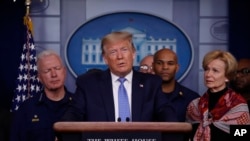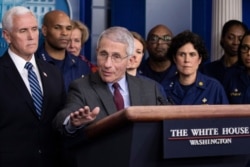U.S. President Donald Trump and other members of his administration are seeking to quell a panicky nation after the shelves at many stores across the country went bare due to hoarding amid the coronavirus pandemic.
Trump, after holding a conference call Sunday with 30 grocery executives, said: “You don't have to buy so much. Take it easy. Just relax.”
The president said, “We have no shortages other than people are buying anywhere from three to five times what they would normally buy.”
Trump, unannounced, appeared briefly in the press briefing room with some members of the coronavirus task force but did not take questions.
The coronavirus is “something we have tremendous control of,” Trump said before turning the hour-long briefing over to Vice President Mike Pence, who heads the task force.
Some members of that group on the podium expressed greater caution about the course ahead.
The head of the National Institute of Allergy and Infectious Diseases, Dr. Anthony Fauci, emphasized that “the worst is yet ahead for us” while the president’s health secretary, Alex Azar, warned that the pandemic has the potential to overwhelm the capacity of the American health care system.
The briefing was held as more cities and states ordered restrictions for the sizes of public gatherings.
Governor Gavin Newsom order the closure of all bars and wineries in California, which has the largest population of any state. He also declared that people aged 65 or older enter into home isolation as they are a high-risk group for complications from contracting COVID-19.
The governor of the state of Ohio, Mike DeWine, ordered all restaurants to not seat any customers – take-out and delivery service only.
The same restrictions apply to New York and Los Angeles, the nation’s two largest cities, after their respective mayors announced new restrictions late Sunday that also include closing entertainment venues such as movie theaters.
“We are taking a series of actions that we never would have taken otherwise in an effort to save the lives of loved ones and our neighbors,” New York Mayor Bill de Blasio said.
After those announcement, the Centers for Diseases Control and Prevention issued a nationwide recommendation that there be no gatherings of more than 50 people for the next eight weeks.
Asked if there should be nationwide restrictions, as other countries have done, Fauci replied: “To protect the American people we’ll consider anything and everything on the table.”
Officials in at least 35 of the 50 states have either temporarily closed schools, or recommended they close.
New York Governor Andrew Cuomo on Sunday announced schools will close in New York City.
Long wait times and panic were seen at airports across the United States as authorities work under new regulations imposed to deal with the spread of the coronavirus.
Those long lines “are unacceptable,” the acting homeland security secretary, Chad Wolf, told White House reporters, explaining that processes have been adjusted at ports of entry and the wait times, as of Sunday, were down to about 30 minutes.
U.S. nationals and permanent residents who are returning from countries that are part of a new travel ban will be required to undergo additional screening and questioning to determine if they can return to their communities, according to the Department of Homeland Security.
If not required to seek medical help, they will be sent home and will spend two weeks in self-quarantine.
Foreign nationals living in the U.S. who have traveled to countries on the ban, however, will not be allowed to return in the United States. A DHS official said they would have to travel to a third country, not included in the ban, and wait out the two-week period of self-quarantine before traveling to the United States.
The United States has more than 3,621 confirmed coronavirus cases in all but one of the 50 states.
There are 69 deaths reported from the disease in the country.
The Senate, controlled by the president’s Republican party, on Monday is to consider an emergency aid package which the House, controlled by the Democratic Party, has approved.
The legislation includes funds to support small- and medium-sized businesses faced with increased costs from sick leave, as well as individuals incurring loss of income from quarantines or reduced economic activity.
Central to the president’s emergency measures is the expansion of testing for the coronavirus disease.
The United States has been criticized for its slow roll out of coronavirus test kits, and Trump has pledged to accelerate the testing capacity, including setting up drive-through testing sites.
The White House says 1.9 million testing kits will be available this week and a web site to pre-screen those who will be prioritized for such tests is to be online within days.








